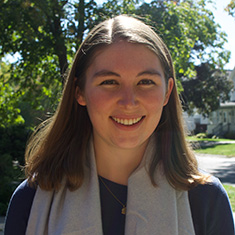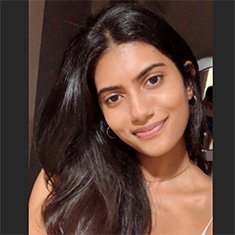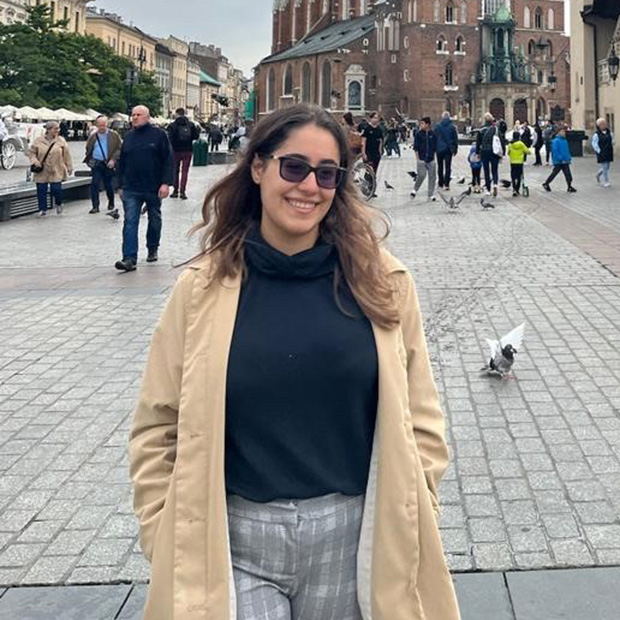Grinnell students gain cherished involvement in brain, autism research
October 27, 2022 — Three Grinnell College students undertaking neuroscience concentrations expanded their knowledge with internships at major research institutions this past summer.
The internships provided invaluable experience in research methods, as well as mentorship with top scientists in their field. And the work that students performed added knowledge and information to current studies and databases used by scientists.
 Sarah Schillinger ’23
Sarah Schillinger ’23
Sarah Schillinger ’23 spent her summer working as a research assistant on the language team at the Center for Autism Research, a collaboration between the University of Pennsylvania and Children’s Hospital of Philadelphia.
“I worked on the same project last summer, so I was able to see it progress,” said Schillinger, a psychology major with neuroscience and linguistics concentrations. “Our study is called the Infant Language Project, which collects data from across the country, looking at ages 0, 12, and 24 months. Some children had older siblings with an autism diagnosis, and some didn’t. Because autism has a genetic component, the design ensured we’d get to look at infants who would go on to be diagnosed with autism and some who wouldn’t.”
Schillinger’s team researched connections between early language and autism.
“I coded infants’ vocalization characteristics (type of speech or non-speech, type of babbling, social directedness, etc.) while they interacted with a parent and clinician,” she says. “Analyzing even more data allows us to gain statistical power. With better statistical power, we hope eventually to use these early vocalization characteristics to actually predict autism diagnoses in individual cases at a very young age. This new strategy would allow for earlier diagnosis, followed by earlier and more successful interventions, as well as a method for diagnosis that is more affordable and accessible.”
The internship, said Schillinger, who’s from Phoenix, was perfect for her because it was heavily language-focused, but with neuroscience components. Eventually she’d like to pursue research in some form, probably studying for a Ph.D. in developmental or clinical psychology. “I want a little bit of time in between graduate school and graduating Grinnell to narrow my research interests. This spring I’ll be applying to different research labs.”
Schillinger was a recipient of a grant from the Center for Careers, Life, and Service (CLS) funded through a gift from Grinnell College Trustee Nancy Radermecher ’83. The grant helped Schillinger with summer living expenses. She commuted to the lab in Philadelphia each day for 7 weeks from Mt. Airy, a Northwest Philadelphia neighborhood. “I was really grateful for the stipend for the summer. Without that, this internship wouldn’t have been possible.”
 Miraya Baid ’23
Miraya Baid ’23
Miraya Baid ’23 worked as a research intern at the Functional Epidemiology Lab at the Seaver Autism Research Institute at Mount Sinai Hospital in New York. Her project focused on the association between a variety of environmental exposures and the risk of developing autism spectrum disorder. The project examined data from a large-scale population study.
“I used to be pretty opposed to the idea of any kind of autism research because it was focused on ‘fixing’ alleged ‘deficits’ that people with autism have, and the whole idea doesn’t align with my opinion,” says Baid, who’s from India.
While the advocacy side still appeals to her, Baid, who’s a biology and psychology double major with a neuroscience concentration, is also drawn to genes and molecules, and realized she could combine her passions to learn about and help people with autism and their families.
“There’s a common consensus that complications during birth/pregnancy lead to autism, but at our lab, we wanted to see whether the same genetic predisposition that leads to symptoms of autism also leads to those complications.” Data science, she says, is a huge thing right now and this internship allowed her to dig in and learn more about it.
Baid was this year’s recipient of the Samir Sen Sashikant ’00 Endowed Internship. Without the funding, she wouldn’t have been able to spend the summer in New York. “I’m so grateful to have applied and gotten this wonderful opportunity to do something I really love,” Baid says. “After working at Mount Sinai, I realize that autism research is making the shift from asking, ‘how can we help you not be yourself?’ to ‘how can we help you live?’ and I’d love to be part of the shift.”
 Andrea Suazo Rivas ’24
Andrea Suazo Rivas ’24
Andrea Suazo Rivas ’24 had an internship with the Nathan Kline Institute (NKI) for Psychiatric Research in Orangeburg, New York, focused on brain aging. “This lab and NKI are carrying out a longitudinal study started in 2012, looking at people from ages 7 to 75, having them do all sorts of things, from MRIs, EEGs, and fitness assessments to neuropsychological assessments,” Suazo says. “I was setting up people to come to the lab, and I was analyzing data, specifically the neuropsychological assessments.”
Suazo, who also was a recipient of a CLS grant supported by Radermecher, worked remotely from Grinnell for 10 weeks, collaborating closely with other scientists and interns. “I benefited a lot from my supervisor, who talked to me about graduate school, conferences, and the psychology field internationally. She gave me a lot of good advice. And I met other interns and got really close with people who have the same interest.”
The information she and colleagues collected will be added to a database of people in different stages of life in order to study brain aging and what influences the brain. “They really emphasize open science and making the data available to scientists all over the world,” says Suazo. “They’re focusing on so many things, and a scientist could grab specific data they want and use it for free.”
A psychology major with a neuroscience concentration, Suazo, who’s from Honduras, fell in love with learning about the brain after watching a documentary on brain games in 7th grade. Her post-graduation plans include attending a graduate program for clinical neuropsychology, then working with people with brain disorders, dementia, and traumatic brain injuries, to assess and diagnose them, and help with treatment.
“I love learning more about how the brain works and particularly how it works when something goes wrong,” she says. “There are so many mysteries to the brain, and I like the fact that you can study and assess it and help people.”
— by Anne Stein ’84
For your information:
Grinnell alumni participating in the Society for Neuroscience Conference are invited to join students and faculty members at a reception in San Diego on Nov. 13. Contact associate professor Andi Tracy at tracyand@grinnell.edu for additional details. Also during the conference, Clark Lindgren, the Patricia A. Johnson Professor of Neuroscience, will receive the society’s Award for Education in Neuroscience.
To read more alumni news, check out our news archive and like the Alumni & Friends Facebook page.